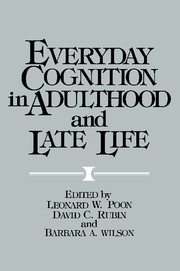Book contents
- Frontmatter
- Contents
- List of contributors
- Preface
- Part I Adult cognitive abilities in the laboratory and in real-life settings: Basic theoretical and methodological issues
- Part IA Systematic approaches to laboratory and real-world research
- 2 Representative design and the quality of generalization
- 3 The myth of external validity
- 4 Functional explanations of memory
- 5 General systems theory: A rationale for the study of everyday memory
- Part IB Combining laboratory and real-world research
- Part II Cognition in adulthood and late life: Findings in real-life settings
- Part IIA Everyday cognitive abilities
- Part IIB Concomitant influences
- Part III Cognitive enhancement and aging: Clinical and educational applications
- Part IIIA Issues and perspectives
- Part IIIB Enhancement approaches
- Part IIIC Designing programs for cognitive rehabilitation
- Subject index
- Author index
5 - General systems theory: A rationale for the study of everyday memory
Published online by Cambridge University Press: 05 October 2013
- Frontmatter
- Contents
- List of contributors
- Preface
- Part I Adult cognitive abilities in the laboratory and in real-life settings: Basic theoretical and methodological issues
- Part IA Systematic approaches to laboratory and real-world research
- 2 Representative design and the quality of generalization
- 3 The myth of external validity
- 4 Functional explanations of memory
- 5 General systems theory: A rationale for the study of everyday memory
- Part IB Combining laboratory and real-world research
- Part II Cognition in adulthood and late life: Findings in real-life settings
- Part IIA Everyday cognitive abilities
- Part IIB Concomitant influences
- Part III Cognitive enhancement and aging: Clinical and educational applications
- Part IIIA Issues and perspectives
- Part IIIB Enhancement approaches
- Part IIIC Designing programs for cognitive rehabilitation
- Subject index
- Author index
Summary
In the course of this chapter, I hope to convince the reader that research methods in cognitive psychology have a great deal to gain by adopting a view of the world based on general systems theory (GST). The study of memory should be no exception. I hope to describe what GST is, how it evolved, and what some core themes and systems functions might be.
The human is a system, I shall argue, and it is nested in social and environmental systems. Memory serves as a control for the availability and flow of information and energy with the human system and between systems, balancing and regulating stimulation. So, I shall argue, memory should be studied keeping in mind its overall purpose, that is, control of the overall daily inner and outer environments in a world in which the present copies the past to some degree.
For memory research, this implies the inclusion of several levels of everyday tasks and the broadening of research questions to include several nested systems. I hope to demonstrate through examples that research questions related to aging make more sense when framed in terms of GST ideas, such as “control of stimulation,” “compensatory strategies,” “boundary flexibility,” and “entropy,” because the systems approach is larger than most other models or approaches. I shall be emphasizing David Rubin's “why” question, although “how” and “when” will be touched on.
- Type
- Chapter
- Information
- Everyday Cognition in Adulthood and Late Life , pp. 59 - 70Publisher: Cambridge University PressPrint publication year: 1989
- 3
- Cited by



